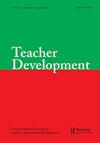Stand out and speak up: exploring empowerment perspectives among advocacy activities of STEM teachers in the US
IF 1.1
Q3 EDUCATION & EDUCATIONAL RESEARCH
引用次数: 0
Abstract
ABSTRACT Science, technology, engineering, and mathematics (STEM) teachers need sources of empowerment to effectively guide education policy and continue to participate in advocacy-based activities. This study surveyed 208 STEM teachers on their acts of advocacy to advance STEM education. The question that guided this research was as follows: What are the underlying factors that contribute to STEM teachers’ advocacy activities in effecting change to STEM education policies? An exploratory factor analysis was conducted to determine underlying factors contributing to STEM teachers’ engagement in advocacy activities via the theoretical lens of empowerment. The findings revealed four factors that empowered their advocacy work: critical confrontations, political awareness, communicative voice, and policymaker influence. The data suggest that as sampled STEM teachers developed a critical consciousness, they were empowered to engage in critical conversations on issues of social justice, such as galvanizing efforts to make STEM education accessible to all students and equitable for diverse learners.脱颖而出,畅所欲言:探索美国STEM教师倡导活动中的赋权视角
科学、技术、工程和数学(STEM)教师需要授权的来源,以有效地指导教育政策,并继续参与基于倡导的活动。本研究调查了208名STEM教师对推进STEM教育的倡导行为。指导本研究的问题如下:STEM教师在影响STEM教育政策变化方面的倡导活动的潜在因素是什么?我们进行了一项探索性因素分析,旨在通过赋权的理论视角确定影响STEM教师参与倡导活动的潜在因素。调查结果揭示了四个增强其倡导工作能力的因素:批判性对抗、政治意识、沟通声音和决策者影响力。数据表明,抽样的STEM教师培养了一种批判意识,他们被授权就社会正义问题进行批判性对话,例如激励努力使所有学生都能接受STEM教育,并为不同的学习者提供公平的教育。
本文章由计算机程序翻译,如有差异,请以英文原文为准。
求助全文
约1分钟内获得全文
求助全文
来源期刊

Teacher Development
EDUCATION & EDUCATIONAL RESEARCH-
CiteScore
2.10
自引率
8.30%
发文量
33
期刊介绍:
Teacher Development is a fully refereed international journal publishing articles on all aspects of teachers" professional development. It acts as a forum for critical and reflective attention to practice in teacher development and aims thereby to contribute to the quality of professional development. The journal takes a "whole-career" view of teacher development, and work from both international and inter-professional perspectives is welcome. Articles may deal with teacher development in varying political and professional contexts, and may be in a variety of styles, in keeping with the diversity of activity in professional development.
 求助内容:
求助内容: 应助结果提醒方式:
应助结果提醒方式:


